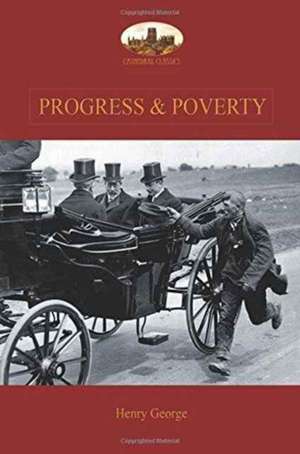Progress and Poverty
Autor Henry Georgeen Limba Engleză Paperback – 9 aug 2016
| Toate formatele și edițiile | Preț | Express |
|---|---|---|
| Paperback (6) | 109.63 lei 6-8 săpt. | +74.51 lei 4-10 zile |
| Dover Publications Inc. – 31 aug 2020 | 159.10 lei 3-4 săpt. | +74.51 lei 4-10 zile |
| AZILOTH BOOKS – 9 aug 2016 | 109.63 lei 6-8 săpt. | |
| Digireads.com – 27 mai 2020 | 113.26 lei 6-8 săpt. | |
| Lulu.Com – 2 aug 2018 | 130.33 lei 6-8 săpt. | |
| COSIMO CLASSICS – 31 mai 2005 | 149.07 lei 6-8 săpt. | |
| Cambridge University Press – 19 iul 2009 | 519.66 lei 6-8 săpt. | |
| Hardback (2) | 230.12 lei 6-8 săpt. | |
| Lulu.Com – aug 2018 | 230.12 lei 6-8 săpt. | |
| COSIMO CLASSICS – 30 sep 2006 | 256.80 lei 6-8 săpt. |
Preț: 109.63 lei
Nou
Puncte Express: 164
Preț estimativ în valută:
20.98€ • 22.80$ • 17.64£
20.98€ • 22.80$ • 17.64£
Carte tipărită la comandă
Livrare economică 21 aprilie-05 mai
Preluare comenzi: 021 569.72.76
Specificații
ISBN-13: 9781911405078
ISBN-10: 1911405071
Pagini: 356
Dimensiuni: 152 x 229 x 19 mm
Greutate: 0.48 kg
Editura: AZILOTH BOOKS
ISBN-10: 1911405071
Pagini: 356
Dimensiuni: 152 x 229 x 19 mm
Greutate: 0.48 kg
Editura: AZILOTH BOOKS
Notă biografică
Henry George (1839-97) went to sea on a merchant ship at age 15 and by the end of the 1850s was working in San Francisco as a typesetter. A career in journalism followed, and George gradually become a successful popular speaker on the issues of his day as well as an effective writer. He moved to New York around the time Progress and Poverty was published and ran for mayor, losing in an election that may have been marred by fraud. His second campaign for mayor ended with a fatal stroke. Thousands turned out for his funeral, which was described as the largest in New York's history (or at least the largest since the death of Abraham Lincoln); even George's bitterest opponents at Tammany Hall flew their flag at half-staff on that day.
Cuprins
Introductory; 1. Wages and capital; 2. Population and subsistence; 3. The laws of distribution; 4. Effect of material progress upon the distribution of wealth; 5. The problem solved; 6. The remedy; 7. Justice of the remedy; 8. Application of the remedy; 9. Effects of the remedy; 10. The law of human progress; Conclusion; 'Progress and Poverty': a reply to Mr Henry George; The bitter cry of outcast London.
Descriere
Descriere de la o altă ediție sau format:
Three very different aspects of the late nineteenth-century debate on poverty.
Three very different aspects of the late nineteenth-century debate on poverty.
